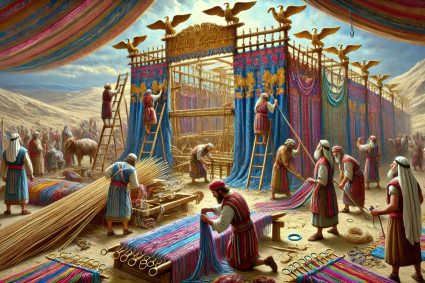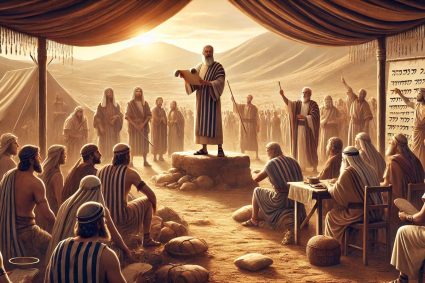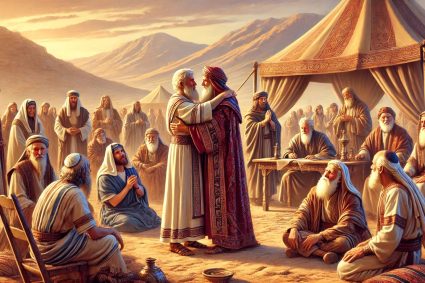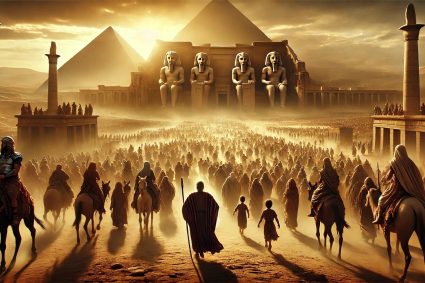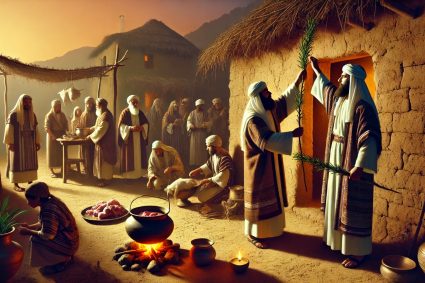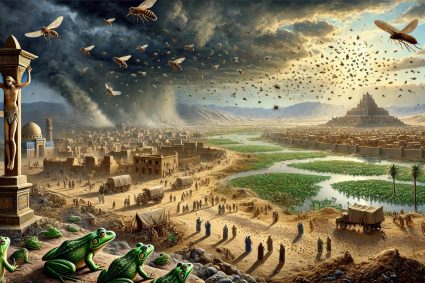
July 4, 2024
DAILY BIBLE READING – Nahum Chapter 3
1 Woe to the bloody city! it is all full of lies and robbery; the prey departeth not;
2 The noise of a whip, and the noise of the rattling of the wheels, and of the pransing horses, and of the jumping chariots.
3 The horseman lifteth up both the bright sword and the glittering spear: and there is a multitude of slain, and a great number of carcases; and there is none end of their corpses; they stumble upon their corpses:
4 Because of the multitude of the whoredoms of the wellfavoured harlot, the mistress of witchcrafts, that selleth nations through her whoredoms, and families through her witchcrafts.
5 Behold, I am against thee, saith the Lord of hosts; and I will discover thy skirts upon thy face, and I will shew the nations thy nakedness, and the kingdoms thy shame.
6 And I will cast abominable filth upon thee, and make thee vile, and will set thee as a gazingstock.
7 And it shall come to pass, that all they that look upon thee shall flee from thee, and say, Nineveh is laid waste: who will bemoan her? whence shall I seek comforters for thee?
8 Art thou better than populous No, that was situate among the rivers, that had the waters round about it, whose rampart was the sea, and her wall was from the sea?
9 Ethiopia and Egypt were her strength, and it was infinite; Put and Lubim were thy helpers.
10 Yet was she carried away, she went into captivity: her young children also were dashed in pieces at the top of all the streets: and they cast lots for her honourable men, and all her great men were bound in chains.
11 Thou also shalt be drunken: thou shalt be hid, thou also shalt seek strength because of the enemy.
12 All thy strong holds shall be like fig trees with the firstripe figs: if they be shaken, they shall even fall into the mouth of the eater.
13 Behold, thy people in the midst of thee are women: the gates of thy land shall be set wide open unto thine enemies: the fire shall devour thy bars.
14 Draw thee waters for the siege, fortify thy strong holds: go into clay, and tread the morter, make strong the brickkiln.
15 There shall the fire devour thee; the sword shall cut thee off, it shall eat thee up like the cankerworm: make thyself many as the cankerworm, make thyself many as the locusts.
16 Thou hast multiplied thy merchants above the stars of heaven: the cankerworm spoileth, and fleeth away.
17 Thy crowned are as the locusts, and thy captains as the great grasshoppers, which camp in the hedges in the cold day, but when the sun ariseth they flee away, and their place is not known where they are.
18 Thy shepherds slumber, O king of Assyria: thy nobles shall dwell in the dust: thy people is scattered upon the mountains, and no man gathereth them.
19 There is no healing of thy bruise; thy wound is grievous: all that hear the bruit of thee shall clap the hands over thee: for upon whom hath not thy wickedness passed continually?
King James Version. Public Domain
Commentary
Verse 1:
The condemnation of Nineveh begins with a sharp accusation against the city, described as murderous, full of lies and robbery. Its incessant wickedness has drawn the wrath of God.
Verses 2-3:
A vivid depiction of the impending war is given. Whips, rattling wheels, galloping horses, and rolling chariots symbolize the chaos and violence of the siege. The city is overrun by horsemen with flashing swords and spears, and the many slain and corpses illustrate the brutality of the destruction.
Verse 4:
The cause of this catastrophe is Nineveh’s harlotry and sorcery. The city is portrayed as a beautiful harlot who has enslaved other nations through her allure and magical arts. This sin has provoked divine retribution.
Verses 5-7:
God Himself declares that He will act against Nineveh. The city will be exposed, and her shame will be shown to the nations and kingdoms. This humiliation will be so great that no one will pity Nineveh, and there will be no one to comfort the city.
Verses 8-10:
A comparison is made to the once-mighty city of No-Amon, which also lay by the waters and seemed protected by its strategic location. Yet it was destroyed, its children dashed to pieces, and its nobles put in chains. This serves as a warning that Nineveh, despite its power, is not invincible.
Verse 11:
Nineveh will be forced to flee in shame and seek refuge from the enemy, just as No-Amon did.
Verses 12-13:
A mocking song describes Nineveh’s helplessness. The city’s fortresses will be like ripe figs that fall at the slightest shake. The people are described as weak, and the gates will be opened to the enemy while fire destroys the defenses.
Verses 14-15:
The city is urged to prepare for the siege by drawing water and strengthening its fortifications. Yet all these efforts will be in vain, for fire and sword will destroy the city, and the people will scatter like locusts and grasshoppers.
Verses 16-17:
Despite the multitude of merchants and leading figures in Nineveh, they will all disappear. The officials and captains, who camp on the hedges in the cold days, will fly away at sunrise and never be seen again.
Verses 18-19:
The shepherds and mighty men of Assyria will sleep and neglect their people, who will be scattered and helpless. No one will be able to heal Nineveh’s injury, and her wound will be incurable. All who hear of her downfall will rejoice, as Nineveh’s wickedness has affected many.
Summary:
Nahum Chapter 3 is a poignant and detailed prophecy of Nineveh’s downfall. The city is condemned for its sins and cruel dominion over other nations. The vivid descriptions of war and destruction paint a picture of divine wrath and inevitable retribution. Despite its former power and wealth, Nineveh is doomed, and no one will pity or comfort the once proud city. The prophecy ends with a final and complete condemnation, underscoring God’s justice and the inevitable fate of the wicked city.
![]()

WEEKLY SPIRIT OF PROPHECY READING – Ellen White | The Desire of Ages Chapter 42: Tradition
This chapter is based on Matthew 15:1-20; Mark 7:1-23.
Read online here.
Commentary
Background and Context:
Chapter 42 addresses the confrontation between Jesus and the Pharisees as well as the scribes who intended to trap him. The Pharisees and scribes were eager to accuse Jesus of disregarding the traditional regulations, particularly concerning ritual cleansings. These regulations, created as protective measures around God’s law, had become so significant over time that they overshadowed the actual commandments of God.
The Accusation of the Pharisees and Scribes:
The Pharisees and scribes confront Jesus and ask him why his disciples transgress the traditions of the elders by not washing their hands before eating (Matthew 15:2). This question indicates that the religious leaders valued human traditions more than God’s actual commandments.
Jesus’ Response and True Purity:
Jesus does not directly defend himself or his disciples but points out the hypocrisy of the Pharisees. He quotes Isaiah to highlight their hearts’ distance from God (Matthew 15:7-9). Jesus emphasizes that what comes from outside into a person does not defile them, but what comes from the heart does. Evil thoughts, words, and deeds are the true source of defilement, not the neglect of external, man-made ordinances.
Criticism of Human Traditions:
Jesus makes it clear that the Pharisees and scribes nullify God’s commandments through their traditions. An example of this is the practice of refusing support to parents by declaring possessions as “Korban” (offering). This practice illustrates how human traditions are misused to circumvent divine commandments (Mark 7:9-12).
Resistance and Hostility:
The Pharisees’ reaction to Jesus’ words is anger, as they see their falsehood and hypocrisy exposed. Jesus points out that human customs and traditions not originating from God are ultimately worthless and will be uprooted (Matthew 15:13).
Relevance and Application:
Even today, people tend to place human traditions and customs above God’s commandments. This tendency often leads to hostility towards those who point out the flaws in such practices. In modern Christian practice, many institutions and traditions have no better foundation than the traditions of the fathers. It is crucial that we rely on God’s word and not be distracted by human regulations.
Summary:
Chapter 42 illuminates the dispute between Jesus and the religious leaders of his time regarding the importance of traditions compared to God’s commandments. Jesus emphasizes the importance of inner purity and adhering to divine commandments over human traditions. This teaching remains relevant, reminding us that true purity and obedience to God come from the heart and are not determined by external rituals or human regulations.

WEEKLY SPIRIT OF PROPHECY READING – Ellen White | The Desire of Ages Chapter 43: Barriers Broken Down
This chapter is based on Matthew 15:21-28; Mark 7:24-30.
Read online here.
Commentary
Background and Context:
After his encounter with the Pharisees, Jesus withdraws from Capernaum and travels to the region of Tyre and Sidon to find seclusion and rest. This journey not only aims for rest but also serves to prepare his disciples for their future mission, which will extend beyond the borders of Israel. Jesus uses this opportunity to teach his disciples important lessons about grace, faith, and the universality of the gospel.
The Encounter with the Canaanite Woman:
Verses 21-22: The Canaanite woman who approaches Jesus presents a remarkable contrast to the religious leaders who have just challenged him. She is a Gentile, despised and excluded by the Jews, yet she shows deep faith and remarkable persistence by asking Jesus to heal her daughter. Her address, “Lord, Son of David,” indicates her recognition of his messianic role.
The Testing of Faith:
Jesus initially ignores the woman’s plea and gives her an apparently dismissive response. This reaction may seem harsh or heartless but serves a deeper purpose. Jesus wants to highlight to his disciples the prevalent prejudices and the harsh attitude of the Jews towards Gentiles. At the same time, he tests the woman’s faith and gives her the opportunity to demonstrate her steadfast faith and humility.
The Woman’s Response:
Despite the dismissive words, the woman remains undeterred. She seizes the opportunity and responds with remarkable humility and faith, saying that even the dogs eat the crumbs that fall from the children’s table. This response shows that she not only claims God’s grace for herself but also understands his mercy and love that transcend all cultural and ethnic boundaries.
Jesus’ Reaction:
Impressed by her faith and humility, Jesus grants her request and heals her daughter. This action clearly demonstrates that God’s grace and healing are accessible to all, regardless of their background or status. It is a powerful example of overcoming prejudices and the inclusiveness of the gospel.
Lessons for the Disciples:
Jesus uses this encounter to teach his disciples several important lessons:
-
Faith and Persistence: The unwavering faith and persistence of the woman serve as a model for the disciples and all believers.
-
Universality of the Gospel: Jesus shows that his mission and the message of the gospel are not limited to the Jewish people but are meant for all humanity.
-
Overcoming Prejudices: The encounter teaches the disciples to recognize and overcome their own prejudices and those of their culture.
Far-reaching Significance:
This event has far-reaching implications for understanding Jesus’ mission and the role of the disciples. It shows that the gospel is meant to break down barriers of race, culture, and religion, and that faith and humility are the key factors in receiving God’s grace.
Relevance and Application:
Even today, social, cultural, and religious barriers exist that separate people. The lessons from this story remind us that God’s love and grace are accessible to all people and that we as believers are called to carry this message of inclusivity and mercy to the world.
Conclusion:
The story of Jesus and the Canaanite woman is a powerful testimony to overcoming prejudices and the universal nature of the gospel. It shows that true faith and humility are the keys to receiving God’s grace and that no human barrier is strong enough to limit God’s love and mercy. This teaching is as relevant today as it was then, challenging us to live out and share the universal message of the gospel.

WEEKLY SPIRIT OF PROPHECY READING – Ellen White | The Desire of Ages Chapter 44: The True Sign
This chapter is based on Matthew 15:29-39; Matthew 16:1-12; Mark 7:31-37; Mark 8:1-21.
Read online here.
Commentary
Background and Context:
In this chapter, we witness the continuation of Jesus’ ministry in non-Jewish areas following his encounter with the Canaanite woman. He traveled through Sidon, came to the Sea of Galilee, and entered the region of the Decapolis. These regions were predominantly inhabited by Gentiles, which makes Jesus’ mission at this time unusual since he had primarily ministered among the Jews.
The Healing of the Deaf-Mute (Mark 7:31-37):
-
Verse 31: Jesus travels from Tyre through Sidon to the Sea of Galilee, into the region of the Decapolis. This movement shows that Jesus is also working in Gentile areas, indicating that his message and healings are not limited to the Jews.
-
Verses 32-35: People bring a deaf-mute man to Jesus and beg him to heal him. Jesus takes the man aside, puts his fingers in the man’s ears, and touches his tongue. These physical actions demonstrate Jesus’ personal and caring approach. He sighs, looks up to heaven, and says, “Ephphatha” (Be opened). Immediately, the man can hear and speak. This healing not only shows Jesus’ power but also his deep compassion and ability to overcome physical and spiritual barriers.
-
Verses 36-37: Jesus instructs the people not to speak about it, but they spread the news anyway. This shows the overwhelming impact of Jesus’ miracles on the people and their inability to remain silent about such marvelous events.
The Feeding of the Four Thousand (Matthew 15:29-39):
-
Verses 29-31: Jesus goes up a mountain, and a large crowd follows him. They bring the sick and lame to him, and he heals them. These miracles cause the crowd—consisting of Gentiles—to praise the God of Israel. This is remarkable as it shows that Jesus’ works are also recognized among the Gentiles and that God is being praised.
-
Verses 32-39: After the crowd has been with Jesus for three days and has no food left, Jesus expresses his compassion and decides to feed them. The disciples again doubt the possibility of feeding so many people in the wilderness. But Jesus repeats the miracle of feeding: with seven loaves and a few fish, he feeds four thousand men, along with women and children. Seven baskets of leftovers remain. This feeding again shows Jesus’ power and compassion and serves as a model for the disciples that God’s provision is unlimited and extends beyond all cultural boundaries.
The Challenge by the Pharisees and Sadducees (Matthew 16:1-4):
-
Verses 1-4: After returning to Jewish areas, the Pharisees and Sadducees demand a sign from heaven as proof of his divine mission. Jesus rejects this demand and says that no sign will be given except the sign of the prophet Jonah. This response shows that outward signs and miracles alone are not enough to overcome unbelief; it requires an inner change of heart.
Lessons and Application:
-
Faith and Compassion: Jesus’ healing of the deaf-mute and the feeding of the four thousand demonstrate his deep compassion and willingness to help all people, regardless of their background. This teaches us that faith and compassion go hand in hand and that we are called to express our faith through acts of love and care.
-
Overcoming Prejudices: The disciples need to learn to overcome their Jewish prejudices against Gentiles. Jesus’ work in Gentile areas shows that God’s love and grace are accessible to all people. This is an important lesson for us to recognize and overcome prejudices and discrimination in our own lives.
-
The True Sign: Jesus’ response to the Pharisees and Sadducees emphasizes that true signs and wonders are not of an outward nature but consist of an inner change of heart and faith in God’s word. This challenges us to examine our own spiritual lives and ensure that we are not merely seeking outward proofs but striving for a deep and authentic relationship with God.
Summary:
Chapter 44 shows how Jesus breaks down the barriers between Jews and Gentiles, revealing the universal nature of his message and ministry. His healings and miracles in Gentile areas, along with his teachings on true faith, challenge us to overcome our own prejudices and limitations and to develop a deeper, more compassionate, and more authentic relationship with God.
(Visited 13 times, 1 visits today)

